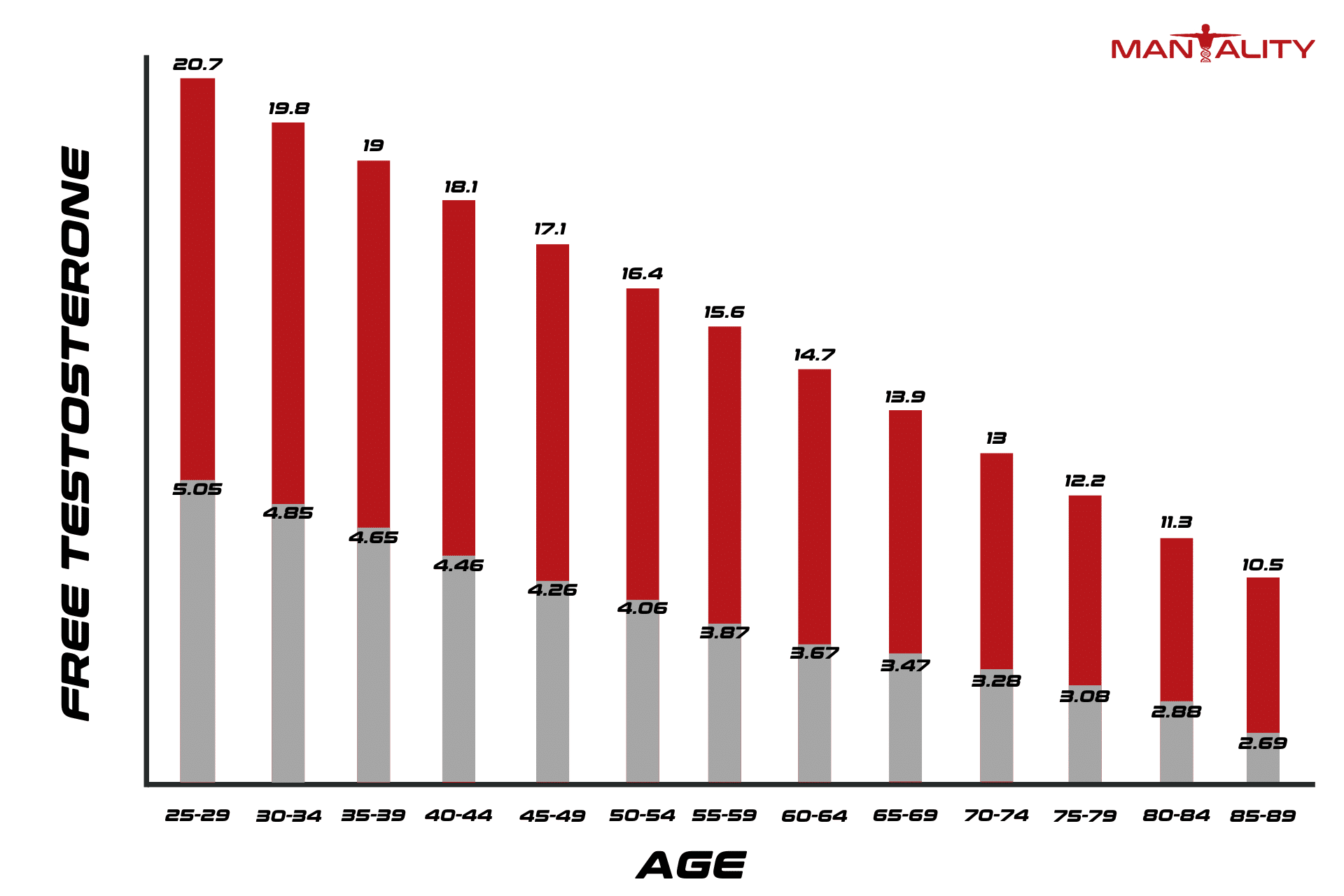Believe it or not, people with higher testosterone levels are more aggressive. So, does testosterone make you angry? The answer is simple: unlike serotonin and cortisol, testosterone triggers aggression in the brain.
Want to learn more? Let’s examine the link between testosterone and aggression, including what scientific research says!
What Does Testosterone Do?
First of all, what does testosterone do? To be quite honest with you, most people think that testosterone’s main role is to make people violent and aggressive. While it does control a man’s mood, it always has plenty of other useful functions.
We’re talking about testosterone’s role in preventing disease and maintaining health in male individuals. Not only that, but women actually have testosterone as well. Yes, you read that right – it’s not just guys that have this essential hormone in their bodies.
Let us explain. In addition to testosterone’s vital role in men’s sexual health, it also plays a key role in the following functions:
- Bone strength and growth
- Muscle strength and size
- The growth of facial hair
- The deepening of vocal cords
To paint a more clear picture for you, young boys that grow up with low testosterone levels might have a harder time developing the same muscles, body hair, and deepened voice as other boys their age. On top of that, testosterone plays a huge role in maintaining a so-called “normal” mood as well.
Let’s dive in a bit deeper. When your brain sends signals to your pituitary gland, that controls how much or how little testosterone that your body produces. What happens next is that your pituitary gland will send another signal to the male reproductive system to create testosterone.
Then, something called a feedback loop checks to see how much testosterone is released into your blood. What happens when there’s too much testosterone? In that case, the person’s brain will send an urgent message to the pituitary gland to slow down the production of testosterone.
The craziest part is that testosterone is also super essential for females to maintain a healthy reproductive system. Known as an androgen in women, testosterone helps them out too!
Why High Testosterone is Bad
When it comes to normal testosterone levels in men, it’s possible to have too much of a good thing. That being said, it’s not exactly the most common thing in the world for someone to have too much testosterone production.
Perhaps that’s because it’s pretty difficult to figure out what a normal testosterone level in males looks like. And since testosterone blood levels change drastically as time goes on, it can even be challenging to track throughout a single day.
As if that’s not enough, sometimes the symptoms of high testosterone can be totally unrelated to the levels of testosterone in the body. Incredibly enough, the majority of what scientists are taught about high testosterone levels typically has to do with anabolic steroid use among athletes.
Okay, so here’s what makes high testosterone such bad news for men of any age:
- Delusions, impaired judgments, irritability, euphoria, mood swings
- Hyper aggressive behaviors
- Increased blood clot risk
- Extreme headaches
- High cholesterol and blood pressure
But wait – there’s more. As a matter of fact, we’re only getting started, especially since additional symptoms of high testosterone include things like significant weight gain and fluid retention in the body. Not to mention severe swelling of the feet and legs.
Sounds fun, right? We didn’t think so, but the truth is, high testosterone levels don’t just affect men either. For women, the primary consequence of having too much testosterone is a disease called polycystic ovary syndrome.
Nicknamed PCOS, it’s a common ailment that impacts a decent percentage of women that haven’t hit menopause yet. Side effects of high testosterone levels in women include symptoms such as:
- Decreased fertility
- Excess facial hair
- Male-pattern baldness
- Skin thickening
- Anxiety and depression
Also, that’s not even counting the male symptoms related to high testosterone levels that females face!
Why Low Testosterone is Problematic
If you’re not sure why low testosterone is problematic, we’re here to help. Think about it this way. For years, pharmaceutical organizations have been holding clinical trials to determine the answer to this very question.
What we do know for sure is that the level of testosterone in males continues to drop as they grow older, which is similar to what women go through during menopause. For males, a drop in testosterone leads to less communication between the pituitary gland and the male reproductive system.
Why does this matter? Because fewer messages from the pituitary gland to the male reproductive system can also lead to a reduction in the protein SHBG. The combination of all of this is clear: lower testosterone levels in men.
But here’s the thing. Over a third of males who are more than 45 years old are considered to have lower testosterone levels than usual. In a nutshell, the symptoms of reduced levels of testosterone in men include:
- Weakened bones
- Body hair loss
- Depression, lack of focus, and irritability
- Hot flashes
- Reduced muscle mass
- Loss of facial and body hair
Does this sound like you? If so, then you’ll be happy to find out that you can receive low testosterone therapy to receive the boost that you need.
For instance, males with both low testosterone levels and osteoporosis can lower their risk of fracture and build their bone strength with testosterone replacement therapy alone. While it might be hard to imagine, low testosterone levels impact women as well.
Consider this – when women have an issue with their pituitary gland, they can end up having too little testosterone production in the body too. This can lead to adrenal glands disease. While that might not sound too scary, the symptoms are similar to what men go through!
Conditions That Impact Testosterone Levels
When it comes to conditions that impact testosterone levels, there are a couple that come to mind, which include any injury to the male reproductive system. Although you might be surprised to discover how common this can be, men who experience these injuries might still be able to produce testosterone depending on the damage level.
Moving forward, men that have to take special medications like tranquilizers, morphine, or steroids can experience a change in testosterone levels too. That’s not all. If you’re born with genetic illnesses such as Klinefelter syndrome, it could take a major hit in the testosterone department as well.
Allow us to enlighten you. For people who are born with Klinefelter syndrome, they basically have a defect in their genes that has to do with the sex chromosomes Y and X. In case you didn’t know, men normally have one of each chromosome.
But here’s the kicker: in men with Klinefelter syndrome, they’ll have at least two X chromosomes in addition to their single Y chromosome. And then there’s hemochromatosis. This can occur when men have way too much iron in their blood, causing their pituitary glands to be thrown off.
Naturally, hemochromatosis can negatively impact the production of testosterone in men too. Sound like you? If so, then you might want to think about how testosterone therapy can help you out!
How Testosterone Therapy Can Help
Here’s the light at the end of the tunnel: for those who are dealing with high testosterone levels, it’s essential to find out how testosterone therapy can help. The best part is that testosterone therapy has been approved for several reasons, including low testosterone production.
So, what’s the real deal about testosterone therapy? Good news – testosterone therapy has been proven to treat everything from generalized weakness, low energy, and disabling frailty. In addition, depression, sexual function problems, and cognition issues can be treated by testosterone therapy as well.
Despite this fact, some men that have regular levels of testosterone could show similar signs as males with low testosterone levels. In women, testosterone therapy can take place to ramp up their testosterone levels as well as alleviate symptoms that come along with it.
Here’s the catch. Even people that have normal levels of testosterone choose to go through testosterone therapy too. This could either be a result of a doctor’s request or a personal request.
Picture this: some consider testosterone therapy to be a means to turn back the clock in terms of aging. In fact, it has been proven that men who had normal testosterone levels experienced greater muscle mass, less fat, improved mood, and reduced anxiety while undergoing testosterone therapy.
Similarly, women have also shown comparable results after receiving testosterone therapy. However, we can’t emphasize this enough – the judge is still out on whether people with normal testosterone levels should be receiving testosterone therapy.
Don’t know what your testosterone levels are in the first place? Take a simple blood test to find out!
What to Expect During Testosterone Therapy
For those who are confused about what to expect during testosterone therapy, we’ve got you covered. One of the most common side effects of testosterone therapy is seeing that you’ll see a big improvement in your muscle mass.
Since muscles are so closely linked to testosterone production, you’re almost guaranteed to experience an increase in muscle mass during testosterone therapy. How do we know this? Because testosterone is known to interact with androgen receptors to encourage them to grow more muscle tissue.
Obviously, you’re going to want to continue your regular gym routine as you undergo testosterone therapy too. Additionally, some males who try out testosterone therapy are shocked to discover that it also leads to weight loss.
And get this: another perk of receiving testosterone therapy is that it can result in a huge increase in energy for men. Since low testosterone almost always leads to fatigue and exhaustion, getting treatment can naturally lead to a noticeable boost in energy levels. Besides this, a lot of men who have gone through the necessary treatment have also reported that their everyday brain fog has lifted.
Even though scientists aren’t 100 percent sure what testosterone has to do with energy levels, some believe that it might have to do with testosterone’s impact on mitochondria in the body. Don’t worry if you’re feeling lost – all that you really need to know is that mitochondria control the level of energy in your cells.
If this is proven to be true, then the theory that testosterone “turns on” mitochondria to create more energy could be correct. Until then, researchers have also traced the link between energy and testosterone levels back to malfunctioning androgen receptors. Of course, this leads to fatigue, which is clearly reversed by testosterone replacement therapy!
Testosterone and Aggression: Is There a Link?
Don’t know if there’s a link between testosterone and aggression? We got your back. To make a long story short, science has already shown that too much testosterone does lead to a host of behavioral issues, including hyper aggression.
Besides this symptom, men that have ultra-high levels of testosterone also have higher odds of experiencing things like delusions, impaired judgments, irritability, euphoria, and mood swings too. And we haven’t even mentioned other frustrating ailments linked to high testosterone levels such as increased blood clot risk. extreme headaches, and high cholesterol.
Admit it: nobody wants that, right? If you’re someone who’s sick and tired of dealing with testosterone and aggression, there’s nothing wrong with considering testosterone therapy as a solution. You’ll never know until you try it!
Curious about testosterone treatment for you or a loved one? Don’t hesitate to contact us today!




